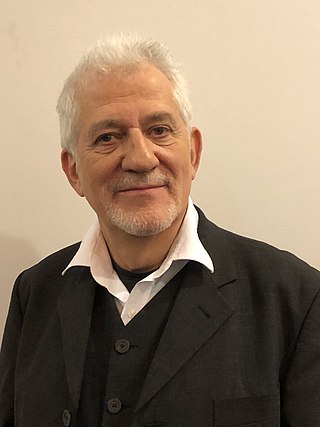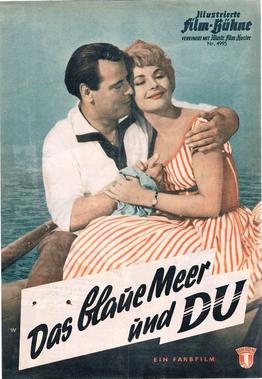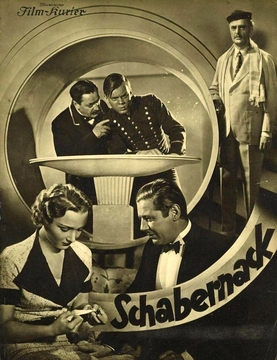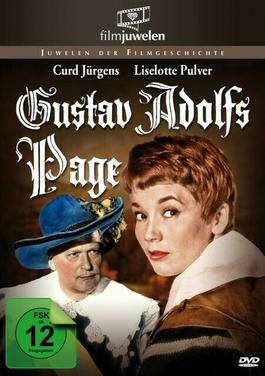
Ilja Richter is a German actor, voice actor, television presenter, singer, theatre director and author, best known as the presenter of the ZDF show Disco.

Tante Trude aus Buxtehude is a 1971 West German comedy film directed by Franz Josef Gottlieb and starring Rudi Carrell, Ilja Richter and Theo Lingen. It was one of several German films in the wake of the 1959 film Some Like It Hot that used cross-dressing as a comic theme.

The Blue Sea and You is a 1959 West German romantic comedy film directed by Thomas Engel and starring Fred Bertelmann, Karin Dor and Renate Ewert.

A Hoax is a 1936 German comedy film directed by E. W. Emo and starring Paul Hörbiger, Trude Marlen, and Hans Moser. It was shot at the National Studios in Berlin. The film's sets were designed by Otto Erdmann and Hans Sohnle.

My Sister and I is a 1954 West German musical film directed by Paul Martin and starring Sonja Ziemann, Adrian Hoven and Herta Staal. It is based on the 1930 stage work of the same name.

My Aunt, Your Aunt is a 1939 German comedy film directed by Carl Boese and starring Ralph Arthur Roberts, Johannes Heesters, and Olly Holzmann. It was shot at the Babelsberg Studios in Berlin. The film's sets were designed by the art director Ernst H. Albrecht. Boese later directed a 1956 film of the same title.

The Mad Aunts Strike Out is a 1971 West German comedy film directed by Franz Josef Gottlieb and starring Rudi Carrell, Ilja Richter, and Mascha Gonska. It is part of a series of cross-dressing comedies inspired by Charley's Aunt and Some Like It Hot.

The Reverend Turns a Blind Eye is a 1971 West German comedy film directed by Harald Vock and starring Roy Black, Uschi Glas and Georg Thomalla. It was followed by a 1972 sequel Always Trouble with the Reverend.

Crazy – Completely Mad is a 1973 West German comedy film directed by Franz Josef Gottlieb and starring Rudi Carrell, Cornelia Froboess, and Monika Lundi.

Dear Miss Doctor is a 1954 West German romantic comedy film directed by Hans H. König and starring Edith Mill, Hans Nielsen and Helmut Schmid.

The King's Prisoner is a 1935 German historical comedy film directed by Carl Boese and starring Michael Bohnen, Paul Kemp, and Susi Lanner. It is based around the development of Meissen porcelain during the eighteenth century, particularly the role of the alchemist Johann Friedrich Böttger. It was shot at the Bavaria Studios in Munich. The film's sets were designed by the art director Max Seefelder.

Countess Ironing-Maid is a 1926 German silent comedy film directed by Constantin J. David and starring Ossi Oswalda, Curt Bois, and Robert Garrison.
Count Cohn is a 1923 German silent film directed by Carl Boese and starring Hermann Vallentin, Frida Richard and Bernd Aldor.
The Woman Without Nerves is a 1930 German adventure film directed by Willi Wolff and starring Ellen Richter, Walter Janssen and Anton Pointner. Interiors were filmed at the Staaken Studios in Berlin. Shot during 1929, it did not premiered until January 1930 at the Marmorhaus in Berlin.
Tragedy of a Marriage is a 1927 German silent drama film directed by Maurice Elvey and starring Isobel Elsom, Alfred Abel and Paul Richter. It is also known by the alternative title of Human Law. It is still extant.

Who Laughs Last, Laughs Best is a 1971 West German musical comedy film directed by Harald Reinl and starring Roy Black, Uschi Glas, and Theo Lingen.

Gustav Adolf's Page is a 1960 German-Austrian historical adventure film directed by Rolf Hansen and starring Liselotte Pulver, Curd Jürgens, and Ellen Schwiers. It is based on the 1882 novel of the same title by Conrad Ferdinand Meyer.

Crime After School is a 1959 West German drama film directed by Alfred Vohrer and starring Peter van Eyck, Christian Wolff and Heidi Brühl. It was based on a novel by Walter Ebert.

The Schimeck Family is a 1935 German comedy film directed by E.W. Emo and starring Hans Moser, Käthe Haack and Hilde Schneider. It was shot at Johannisthal Studios in Berlin. The film's sets were designed by the art directors Karl Böhm and Heinrich Richter. It is based on the play The Schimek Family by Gustaf Kadelburg, previously adapted into a 1926 silent film and later into a 1957 Austrian film.

The Silent Angel is a 1954 West German drama film directed by Harald Reinl and starring Josefin Kipper, Robert Freitag and Christine Kaufmann. It was shot at the Wiesbaden Studios in Hesse and on location in Kastel and Eltville and Kaub in the Rhine Valley. The film's sets were designed by the art director Heinrich Beisenherz.

















